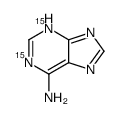| 结构式 | 名称/CAS号 | 全部文献 |
|---|---|---|
 |
金刚烷胺
CAS:768-94-5 |
|
 |
腺嘌呤-1,3-15N2
CAS:97908-71-9 |
| 结构式 | 名称/CAS号 | 全部文献 |
|---|---|---|
 |
金刚烷胺
CAS:768-94-5 |
|
 |
腺嘌呤-1,3-15N2
CAS:97908-71-9 |